PHOTOS BY George Kamper and The Book LLC
Becky Gochman alights from a personalized golf cart. She is clad in a camo jacket, a black-and-white striped long-sleeved shirt trimmed with ruffles topped by a plain, long-sleeved t-shirt, riding breeches, and a wide-brimmed hat to shield her from the South Florida sun. Her energy is palpable. She settles at a table in the Farm Stand area she created at the Winter Equestrian Festival (WEF) in Wellington and peers through green, cat-eye glasses. Passionate about the environment, organic food, sustainable clothing, horses, and her children, the 54-year-old former art teacher emits a positive, cool, hippie vibe.
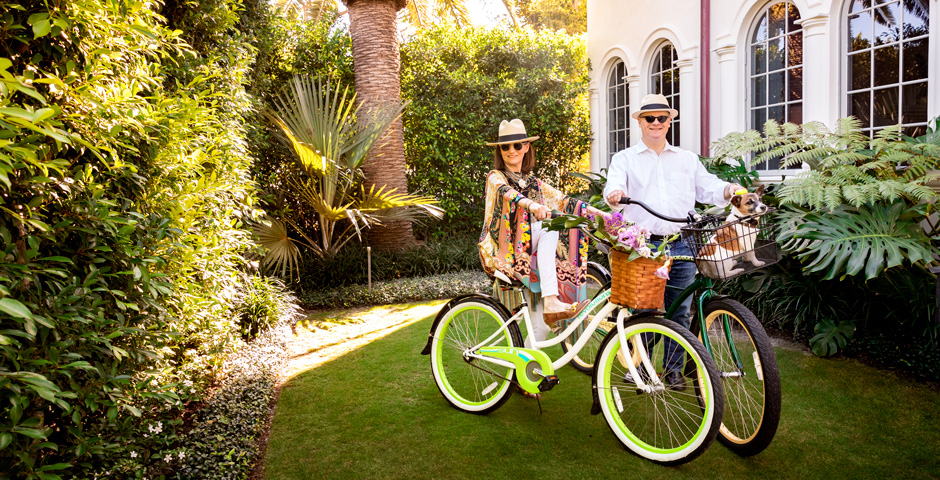
Becky is married to David Gochman, heir to the Academy Sporting Goods empire his father created in Texas. The couple met at the Continental Club in Austin where he asked her to two-step. After a series of dancing lessons, they fell in love, married, divorced for five years, and remarried.
“That’s why we’re kind of older parents, but we stayed friends the whole time,” Becky explained. “It was our path, but it was actually the right path that we had to take. That just made us stronger and more sure of ourselves.”
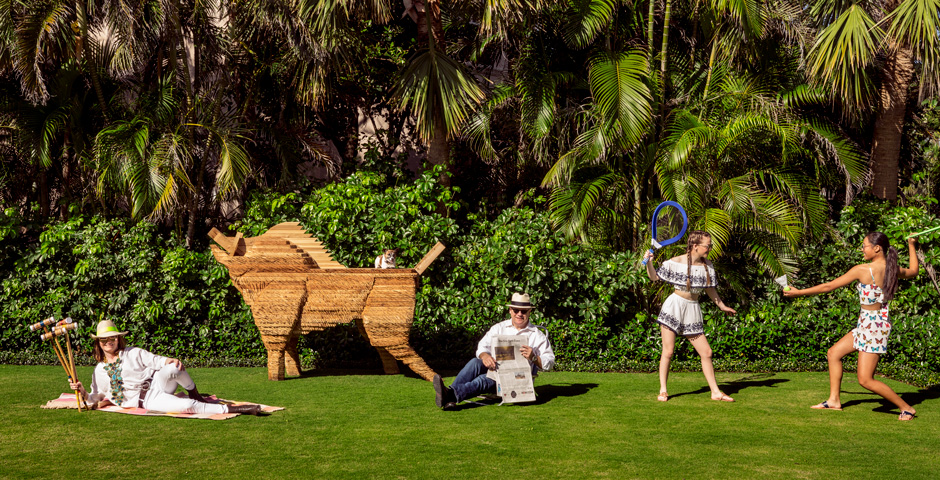
Becky and David are parents to 15-year-old Sophie and 13-year-old Mimi. “I was adopted and David has his masters degree in Asian studies and speaks fluent Chinese,” Becky said. “We wanted to have kids at 39, so we applied for adoption from China.” Soon after, Becky learned she was pregnant, and their family quickly grew: The couple’s adoption efforts proved successful and gave them their daughter Mimi. The girls are a year and a half apart in age. “They are very yin and yang,” she laughed. “One likes the egg yolk, and one likes the egg white. One goes to Spence in New York City, and one goes to Palm Beach Day Academy.”
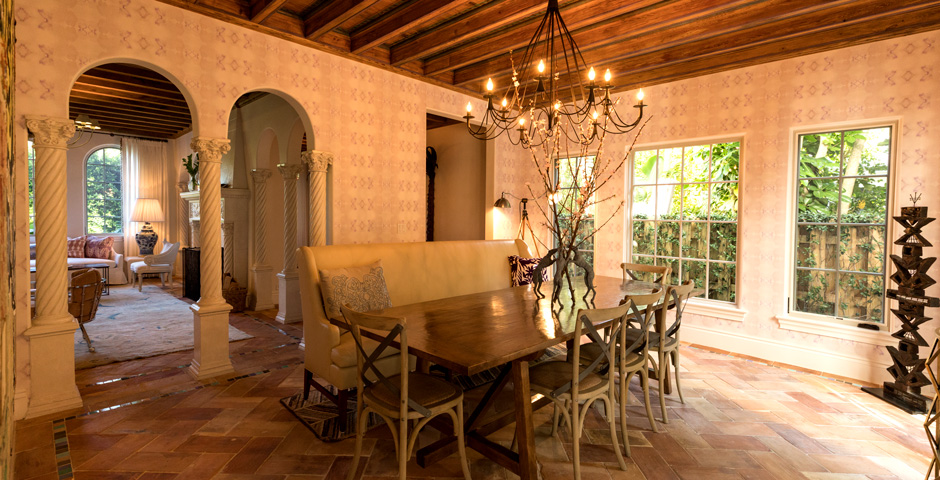
 Throughout the show seasons, the family travels back and forth between Florida and New York, and the parents swap out duties with their two daughters. They never go more than seven days without reuniting.
Throughout the show seasons, the family travels back and forth between Florida and New York, and the parents swap out duties with their two daughters. They never go more than seven days without reuniting.
Fresh from a quick trip to Cuba, where Becky’s eclectic passions steered the family to an organic farm, a Cuban food market, art museums, the Tropicana night club, Hemingway’s house, and the home of a Santería practitioner to see the altars scattered about his living space.
“I really did find his house pretty charming and the energy good,” she mused. “It was full of a lot of natural objects—objects having energy. I thought it was fascinating.”
One of the daughters suggested the family do something to help a Cuban school, but Becky explained that people in the U.S. are also in need.
“I think we should help everybody, but it bothers me that they think the United States doesn’t have problems,” Becky said. “I realized we need to do more. When we went to Africa, we went to a school, and it’s helpful that we donated money, but we need to take more time to do hands-on help. I think it opened so much discussion in the family. Everything is eye-opening at different periods in your life, and you just have to respect where the kids are, what they saw, and what their ideas are.”
She said that although she often looks through rose-colored glasses, she longs to return to Cuba. “I really want to experience more,” she said. “I was glad we asked to go to the real markets to see how they ration their food. I think it’s a pretty smart idea. You get eggs, sugar, coffee, chicken. Each person might get two chicken legs a month, so if you have a family of four, you might get one whole chicken a month. Other than that, you have rice, beans, maybe a little bit of rum. Everybody gets the same no matter how rich or poor, and then you supplement that. They had one of the prettiest fruit markets I have seen. It was very nicely done and beautiful. I really enjoyed that. The people seemed happy, and then you start to question, ‘What’s happiness?’ Maybe it’s a time of life or having kids. I just want to keep exploring some of these places and try to look at these things with an open mind.”
While in the Cuban countryside, Becky, Sophie, and Mimi saw a horse, and, as they hurried to hug it, they took their hair ties off their wrists to braid its mane. “I don’t know what the Cuban farmers thought about us, but if you speak horse, you understand each other,” Becky said. “They use the horses in a different way, but it’s still human and animal. It’s still you caring for something. You are using and experiencing different things, but it is true when they say horses are good for the soul.
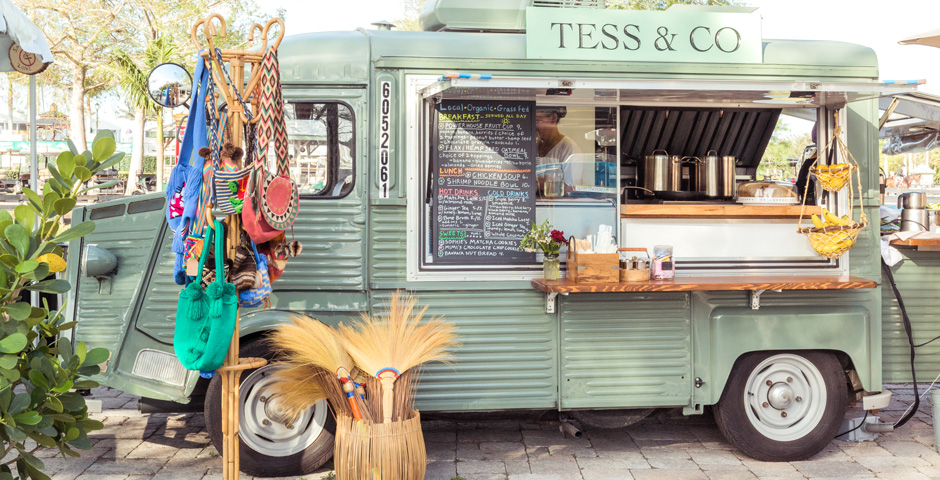
“That’s why we set up Farm Stand at WEF—to make more of a community to connect at the horse show,” Becky continued. “The horse-show culture is interesting because we’re all nomads, and we’re all traveling from place to place. At the horse shows, everybody is so busy. People don’t have time to sit and talk and reflect and enjoy a safe, relaxing place, where they can let down a little bit and discuss what needs to happen.”
As she has watched competition evolve, Becky wanted to bring horse-show food to another level by showing people that healthy offerings can taste good. They leased the area at WEF that had previously housed the original food court, brought in an old French Citroën food truck, and named one of the trendy food kiosks “Tess and Co.” after their housekeeper, who cooks fresh, healthy food. Offerings include green juices, nut milks, wheatgrass and aloe shots, matcha cookies named after Sophie, and Mimi’s vegan chocolate chip cookies. Flowers from the Gochman’s organic farm on their Wellington property are available.
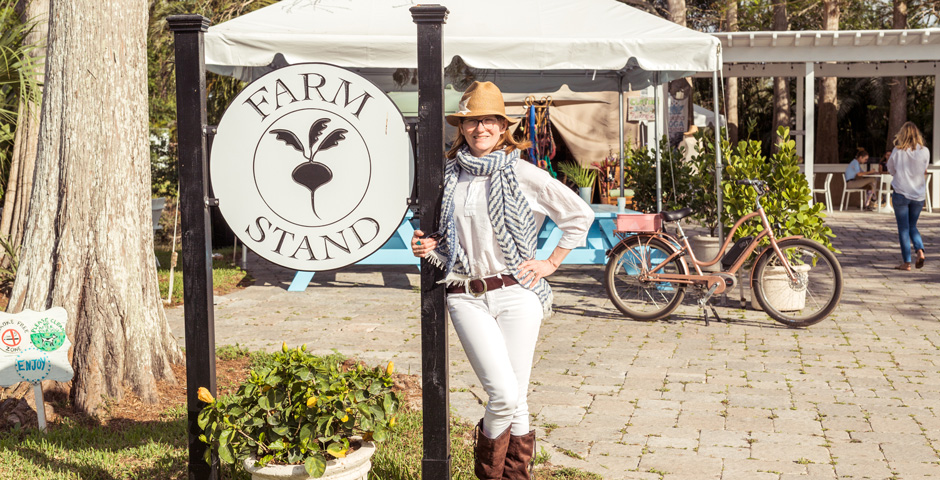
Becky also brought in massage, chiropractic, and yoga practitioners and established a boutique offering Farm-Stand-labeled clothing created with sustainable fabrics and natural dyes. A ping-pong table and phone recharging stations are set among comfortable groupings of tables and chairs. They invite local artists to add to the micro-community within the bustle of WEF.
Mimi loves the ease of living in nearby Grand Prix Village in Wellington. “It’s so close, so easy. No driving and waking up the family,” Becky said. She admits that she forgets to eat during the day, and it’s nice to come to Farm Stand for a meal. “It’s healthy enough and nourishing enough that I get what I need from that one meal of the day. I love the horse show.”
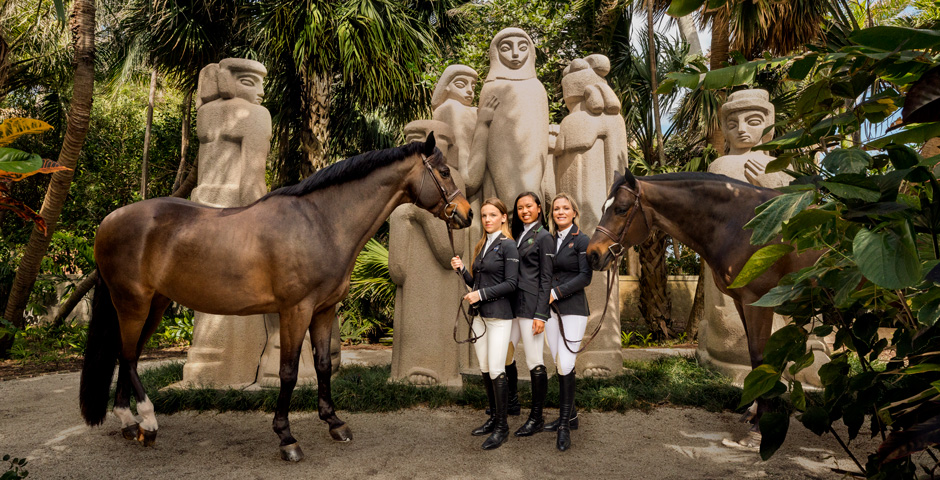
The Gochman women all compete in the circuit in a variety of classes and on a stable full of horses. Becky believes it’s an ideal way to teach her daughters responsibility. “They can get themselves to the ring,” she said. “If they forget something, I don’t help them out any more. We let them bicycle or take their mini-bikes to the ring, and they make their own decisions. The other day, Sophie was riding with two left gloves, and I said, ‘What are you doing?’ And she said, ‘Don’t worry, Mom, I’ve been doing that for three months.’ I have to remember that they’re teenagers, and the horse show is, to me, a pretty safe place for them to figure it out. I think it can be a real growing place, and it’s been a lot of fun for my husband and me to raise our kids in this setting. We’re all addicted. I find that people who ride and are busy with horses can’t be on their cell phones all day. But, at the same time, it’s technology that makes it so people can work and still be at the show. There’s a positive and negative balance there.”
Although the girls ride in many of the same classes, they have found that, as they age, they are a bit less competitive against each other. “We get along very well, and, although we are close in age, we stick together,” Mimi said as she munched on a packet of seaweed snacks. “We used to be more competitive, but we’re kind of laid back, and we support each other. If she wins, we’re all happy. If I win, we’re all happy.”
“But, we’re still competitive people,” Sophie added, “and I want to do the best that I can.”
David doesn’t ride, but he’s an avid supporter of his family of females. “He’s the world’s best horse show dad,” Sophie said of her father, who reads and catches up with work obligations from his golf cart. “He brings us food. He reads his newspaper. He’s friends with one of my best friends’ father, and they sit next to each other in their golf carts at the show. It’s really cute. They both take naps, and they talk about the weather together. They both have about 10,000 weather apps.”
While David, Becky, and Mimi live in the Wellington area during the three months of the winter show circuit, Sophie stays with a trusted tutor who has a horse at their farm, Baxter Hill, in Wellington. Sophie flies to Florida for the weekend competitions. In the fall, Becky returns to the city with Sophie, and David stays in Palm Beach with Mimi. They meet in Kentucky or Devon or wherever the horse show circuit takes them.
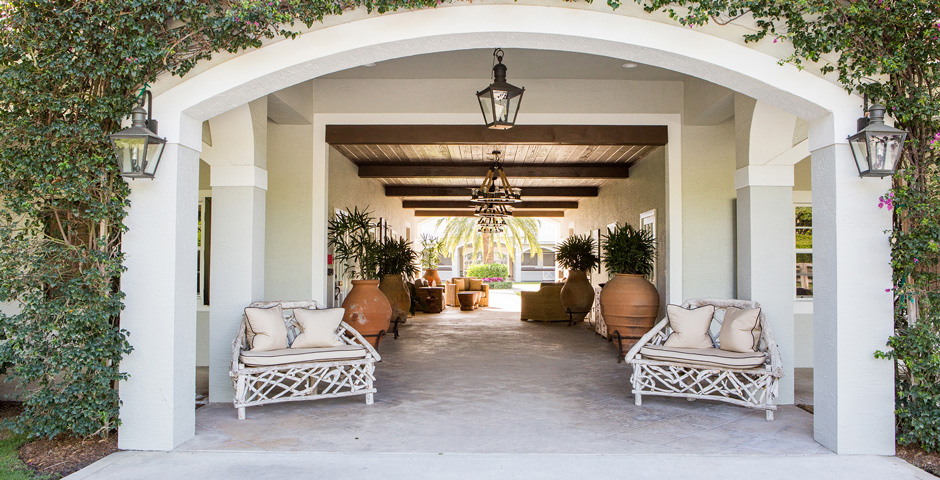
“At first, people thought that it was crazy—especially non-horse show people in New York City—but then they see that maybe it’s not so different than sending your kids to boarding school,” Becky explained. “Maybe education is open for some interpretation right now.”
The Gochmans rely on a cadre of trainers, including Scott Stewart, Ken Berkley, Stacia Madden, and their trainer of eight years who oversees their 12-acre Baxter Hill farm, Amanda Derbyshire from England.
“Amanda has been such a dear to us,” Becky said of their trainer, who rides with Nick Skelton and Laura Kraut. “She’s cool, cute, the nicest person, and a really good influence on these girls.”
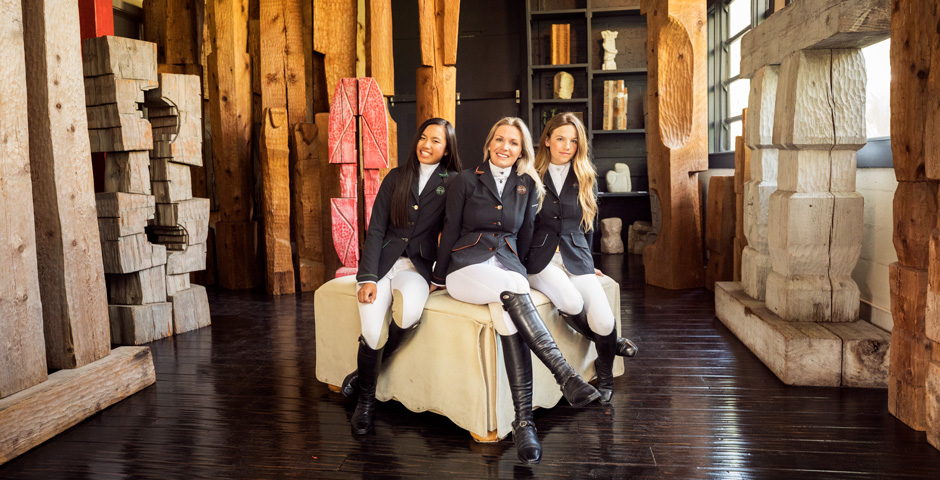
Amanda is a grounding force; she also takes the girls on trail rides and hacks out on the bridle paths, and turns out horses together as they do in her native England.
“My kids had a typical United States horse show education by getting into the pony hunters and pony finals,” Becky said. “They had great success at that, and then they moved toward jumpers and equitation. We’ve always had our private barn, and now it’s nice for them to be with more kids for the equitation part with Stacia Madden. Mimi is still involved with the hunters a little bit, but Sophie made the decision to just do the equitation and jumpers. They are both in the high jumpers. I think they see themselves as going as far as they can, but I think their track is to work in the world doing something other than horses. Maybe they’ll combine a business that has to do with horses. I think the possibilities are limitless.
“This life has served them so well,” Becky continued. “I hope they come back as really great amateur riders. I can’t imagine doing anything too differently because riding teaches them through both success and failure. You can’t ever know if your decisions are the right ones. Sometimes, parents make the wrong decisions, and kids make the wrong decisions and trainers aren’t always right, but as long as you keep learning from your decisions, I think that’s what makes the horse-show world really fascinating.”
